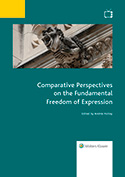 By Jackie Harrison and Stef Pukallus. Published by Wolters Kluwer Ltd, 2015, Hungary, pg 368-387
By Jackie Harrison and Stef Pukallus. Published by Wolters Kluwer Ltd, 2015, Hungary, pg 368-387
A new publication from CFOM was released at the end of last year, written by our chair and a member of our research team. The chapter is included in Comparative Perspectives on the Fundamental Freedom of Expression, a book collecting articles form a range of scholars, each with a distinctive perspective on media freedom. the article is summarised below.
If media freedom and media pluralism are fundamental values in the European union why doesn’t the European union do anything to ensure their application? This chapter addresses the failings of the EU to protect media freedom in all member states. It concludes that the EU, in it’s failing, tolerates impunity and thus allows it’s member states, and prospective member states, not to make it a priority.
Media freedom is an important principle for the EU. It has widely been described by western political philosophers as one of the cornerstones of democracy and true universal suffrage. Yet, despite regular affirmation that media freedom is important, little is done to protect it.
There are several articles detailing the importance of media freedom in Europe and mandating the EU to protect it. Far from fighting for it as the cornerstone of democracy it claims it is, the EU opts for a “soft-approach” in dealing with states going against their policies. This amounts to little more than opening discussion with the potential for a fine that would be unlikely to change any state’s policies. These measures are ineffective.
The EU has the power to step in but does not have the competencies.
More than failing to protect media freedom in current member states, candidate countries have been allowed to become EU members without adequate media freedom standards. This suggests that media freedom is at the least, not a priority for the EU and worse, not considered at all.
The chapter goes on to describe the situations in Bulgaria, Greece, and Croatia and examples of states where media freedom is under threat with little or no protection from the EU. Croatia was allowed to join without improving it’s media freedom standards.
Harrison and Pukallus suggest several reasons for why the EU is failing to protect the free press.
The EU has little power to act. It can open discussion and ultimately fine, but has no way of guaranteeing a solution. In order to better protect journalism in all member states it must have the power to impose adequate sanctions, or otherwise persuade states to fall in line. This would mean coming up against often exceptionally powerful and well funded media owners. If the EU were to have these powers it might be seen as undermining the competencies of the particular states it uses it’s powers against. This could threaten the continent’s respect for the EU and undermine it’s power.
The EU laws do not clearly enough outline what makes a free media, making it hard to hold countries to account.
There’s no clear definition of what makes “sufficient pluralism”. Each state will interpret media freedom differently, thus there is no “one size fits all” solution. it would be exceptionally difficult for the EU to decide upon one, enforceable definition.
This lack of action in cases of media freedom violations has lead to media freedom becoming a very low priority for the EU. It is for this reason that states are allowed to become members without meeting the EU standards.
There is little to no incentive for states to inspect and improve their media freedom protection.
